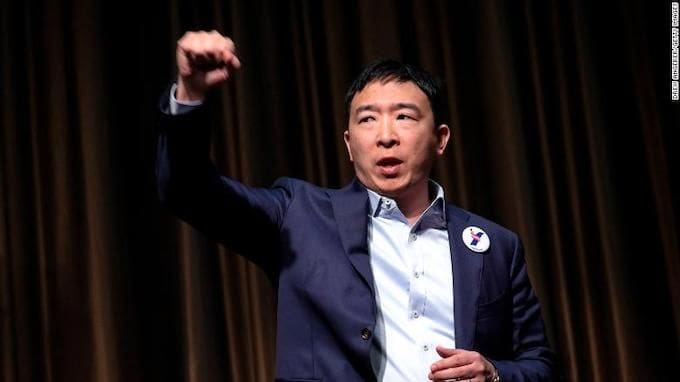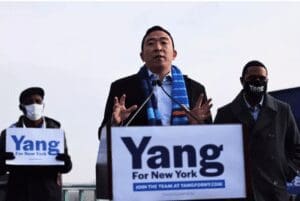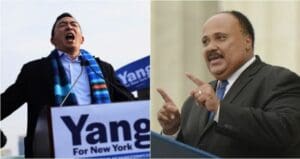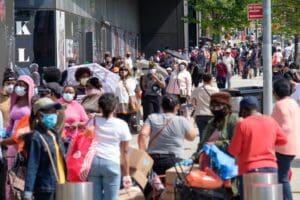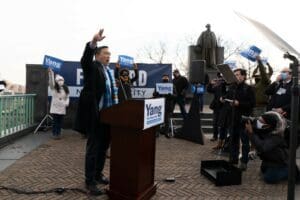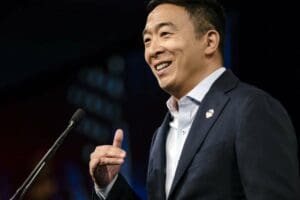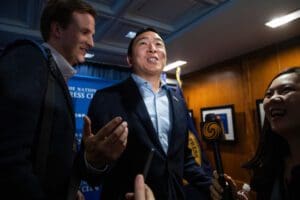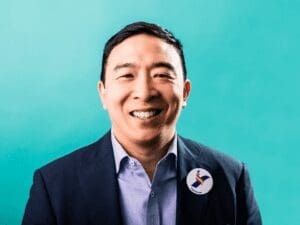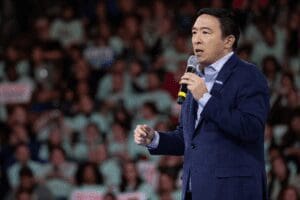(CNN) Quick. Tell me the six highest-polling Democrats in the 2020 Democratic race.
The first few are easy: Joe Biden, Elizabeth Warren and Bernie Sanders. And if you are following things closely, you might even guess the next two: Kamala Harris and Pete Buttigieg.
But who’s next? Beto O’Rourke? Cory Booker? Amy Klobuchar? Wrong. Wrong. And wrong!
It’s actually Andrew Yang — the businessman, technologist and the country’s most high-profile proponent of universal basic income.
According to Real Clear Politics national polling average, Yang is running at 3% — ahead of three sitting senators, two House members, a governor and Tom Steyer. Yang has already qualified for both the September 12 debate and the October debate.
Despite all of that, Yang is getting far less media attention than other candidates who are polling lower and not making those debate stages, according to an analysis by Axios released earlier this week. Yang ranked 14th (out of the field of 19) in terms of articles written about his candidacy and 13th in cable news mentions. (He ranked fourth overall in Twitter mentions during the first two debates.)
Which is, well, stark. Especially when you consider the coverage that candidates running behind Yang in terms of polling are receiving. O’Rourke, who is averaging 2.1% nationally, is ranked fifth in articles written about him and cable news mentions. Booker, the New Jersey senator, is seventh in articles written and sixth in cable news mentions — even though his polling average is below Yang’s. New York City Mayor Bill de Blasio, who is averaging .4% more of the vote than me or you (both at 0%, respectively) ranks sixth(!) in articles and 10th in cable news mentions.
So, why?
Well, what it’s not is some sort of widespread media conspiracy out to get Yang. (Sorry Yang Gang!) The media isn’t organized enough to do that — even if they wanted to.
But I think there are several things to consider when it comes to the gap between Yang’s polling (and fundraising) success and the coverage he has received.
1) Yang is a total outsider, having never run for office before. That’s not a bad thing, but what it means is that at the start of the race no one — including reporters — had any sense of who he was. That’s unlike say, Booker, who has been a known commodity in national circles for the better part of the last decade (or more).
2) Yang’s ideas are radically different. Most of the top-tier candidates are running, primarily, on issues like health care or immigration or maybe guns. Yang is talking about the dangers posed to society by automation and the need for a universal basic income, which he calls a “Freedom Dividend” — a proposal in which every American citizen aged 18 years or older would receive $1,000 a month, every month for their entire lives. It’s different — and different poses challenges to a media used to covering a political race via a certain set of established guidelines.
3) Ron Paul. Yes, Paul, the former Texas congressman. He ran for the Republican presidential nomination twice (in 2008 and 2012) and was, like Yang, someone who inspired huge devotion online and off. At every debate, the Paul forces were loud and proud. There was some chatter that he might just stun the political world and win the nomination. Except that Paul’s support proved deep but not wide. Sure, there was a decent chunk of people who were drawn to his outspoken opposition to the Federal Reserve and desire to pull the US out of its various foreign military entanglements. But a) there wasn’t enough of that crowd and b) Paul could never grow his support beyond that dedicated core. Yang has a lot of the same appeal as Paul — and there could well be a tendency to write him off as a result.
In CNN’s most recent 2020 rankings, which I co-author, we moved Yang out of the top 10, choosing Steyer, the wealthy businessman instead. Why? Not because I hate Yang. (Sorry internet!) Rather because Steyer was poised to make the September debate stage (he wound up missing it by a single poll) and that his massive personal wealth made him slightly more viable than Yang. In retrospect, that was a mistake — one which we will correct in the rankings that come out Thursday.
The broader point here is that there are legitimate, non-media conspiracy reasons to explain why Yang isn’t getting noticed as much as he should be.
But candidly, he should be getting more attention. If the 2016 election taught us anything, it’s that voters are very sick of the status quo and politics as usual. Writing off Yang’s candidacy because of his lack of political background or willingness to talk about less high-profile issues isn’t a mistake we should make.











